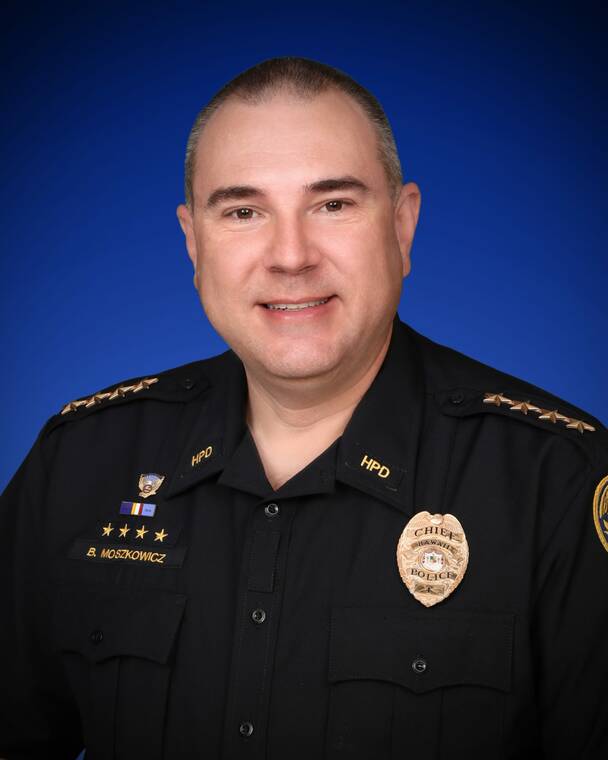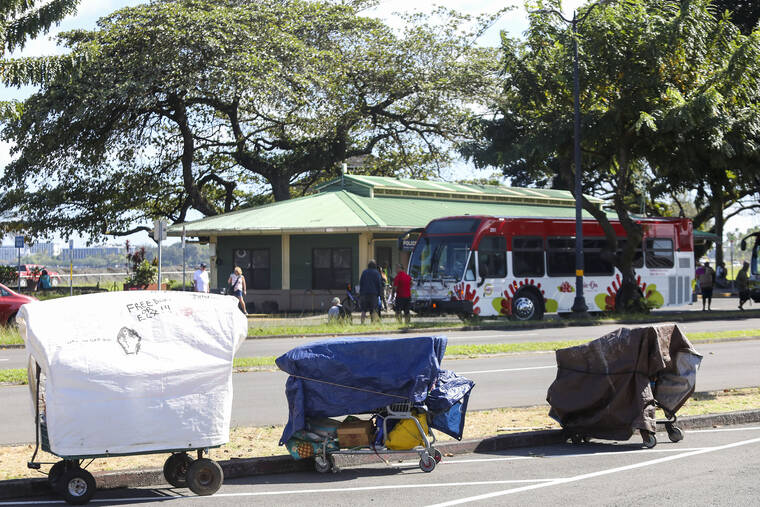‘Enforcement action’ conducted: Camps of homeless and others cleared by county, state

MESSINA

MOSZKOWICZ

Kelsey Walling/Tribune-Herald Carts full of items from homeless individuals are lined up across Kamehameha Avenue near the Mo'oheau Bus Terminal.
Hawaii County and the state combined forces Thursday and Friday for a sweep of a homeless encampment at Russell Carroll Mo‘oheau County Park in downtown Hilo.
Hawaii County and the state combined forces Thursday and Friday for a sweep of a homeless encampment at Russell Carroll Mo‘oheau County Park in downtown Hilo.
Maurice Messina, county Parks and Recreation director, on Friday called the operation a “park rules enforcement action.”
ADVERTISING
“We started doing outreach about a week or so ago,” he told the Tribune-Herald. “We’ve been getting a lot of complaints about individuals that were camping along the fence line and along the Hilo Bayfront Trails. We were getting a lot of reports about feces, about assaults, illegal activity — drinking, drugs, gambling.”
Messina said he took the public’s concerns to Mayor Mitch Roth and received the go-ahead for an operation that “included all of our outreach activities and everything.”
In addition to Parks and Rec, those involved included police, the county Office of Housing and Community Development, the state Department of Land and Natural Resources and its Division of Conservation and Resources Enforcement officers, “and a few other entities.”
“We put together an operations plan that was not just targeted at homeless people,” Messina said. “Because it’s not just homeless who are down there, shooting craps, leaving needles and stuff like that. It’s also other people.”
According to Messina, the goal was “to clean up all the messes that were down there, because the park area that we cleaned up is going to be closed for ‘The Wall That Heals,’ which comes in on Monday” (see A1 for related story).
Messina said he and Michelle Hiraishi, his deputy, conducted outreach “with every single homeless person in the area for about a week.”
“I’ll tell you the reality,” he said. “We were out there talking to them, and we were seeing bottles of liquor, we’re seeing meth, we’re seeing a lot of drug use, people not picking up after their animals. And we get a lot of people come into our office and say, ‘When are you going to do something about it, because it’s not safe to walk along Bayfront Trails?’
“On top of that, we also had all of the illegal activity and stuff that was happening in the parking lot area of Mo‘oheau Bus Stop.”
Messina said the county’s park-and-ride lot will be at the Afook-Chinen Civic Auditorium during the week “The Wall That Heals” is on display in the park.
Cyrus Johnasen, Roth’s spokesman, said the personal belongings of three individuals are being stored at the Parks and Rec’s maintenance baseyard. The individuals have 30 days to retrieve the stored belongings.
Police Chief Benjamin Moszkowicz said the Hilo Community Policing Section assisted with the enforcement action.
“We’ve been out and talked to people and provided outreach services and brought service providers to the bandstand area and the bus terminal area, that area along the fence line, to try to get people relocated and get them services,” he said.
Both Messina and Moszkowicz said no one was arrested or cited during the operation.
“That’s our goal: no arrests or citations,” Moszkowicz said.
A memo dated Wednesday and titled “Notice to Vacate” was distributed to those in the area. The memo, signed by Gordon Heit, Hawaii District land agent for the Board of Land and Natural Resources, warned: “Any and all persons occupying, camping and/or residing upon subject lands” after 12 noon Thursday “shall be subject to arrest and prosecution for trespassing and … a fine of up to $5,000 a day.”
The document also stated “any and all vehicles, bicycles, boats, stacks of lumber, structures and personal belongings” found there “shall be considered abandoned and shall be sold, donated or otherwise disposed of” by the state “at the former owner’s cost and expense.”
“In one area, where the monkeypod trees are, where Mass Transit does their park-and-ride, on Wednesday we contacted 12 individuals in that area,” said Messina. He added that on Friday, “there were only two people left — one person who had just gotten out of the hospital a few hours earlier, and another man who was recently removed from living atop the banyan tree at Hilo soccer fields.”
“So, a lot of people had moved. HOPE Services was out (Friday) providing outreach services,” he said. “Everything was coordinated, and right now, people will feel safe again walking along Hilo Bayfront Trails.”
Messina said that 4 tons of rubbish were removed from along the fence line.
Moszkowicz, like Messina, called the operation “park rules enforcement” and objected to the term “homeless sweep,” which he said has a negative connotation. Johnasen also insisted the action wasn’t a sweep.
“These events extend beyond a single day, commencing with several days of outreach and education,” Johnasen said. “This provides individuals with ample time to plan their relocation. In addition to offering relocation services, our partners engage in outreach to guarantee that those affected have access to various services, such as meals, medical assistance, and other social services. These events are conducted thoughtfully, respectfully, and with the best interests of all involved individuals in mind.”
HOPE Services, a nonprofit agency providing homeless services, said it sheltered 10 people displaced by the action — two single men, one single woman and a family with a five-year-old son.
On its Facebook page, HOPE Services called the enforcement action a “homeless sweep” and said, “We do not support homeless sweeps.”
“This sweep displaced our neighbors. This sweep endangered people by separating them from their community and their belongings.” the post said.
“Homeless sweeps have gotten a bad rap recently, because people realize that they are cruel and counterproductive. Sweeps waste resources by pushing people around on the streets, instead of investing in housing and services,” the nonprofit said in its post. “Prepare yourself: the people responsible for homeless sweeps will often claim that what they’ve done does not constitute a sweep. Don’t let yourself be fooled. If it looks like a sweep and functions as a sweep, it’s a sweep.”
The American Civil Liberties Union of Hawaii has an ongoing lawsuit in Honolulu Circuit Court seeking to stop the City and County of Honolulu from continuing to conduct the sweeps, contending they violate the rights of homeless people under the state constitution.
While the civil suit is ongoing, Honolulu Circuit Judge John Tonaki earlier this month denied a motion by the ACLU for an injunction to immediately cease the sweeps.
Email John Burnett at jburnett@hawaiitribune-herald.com.


